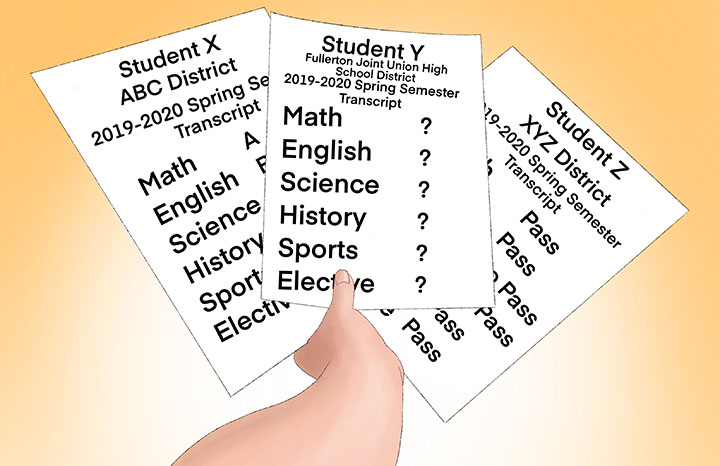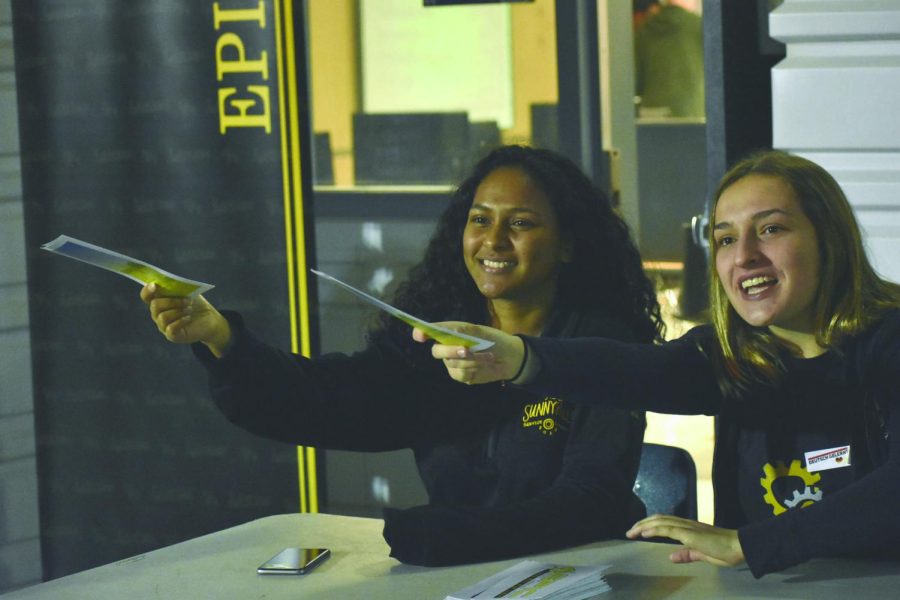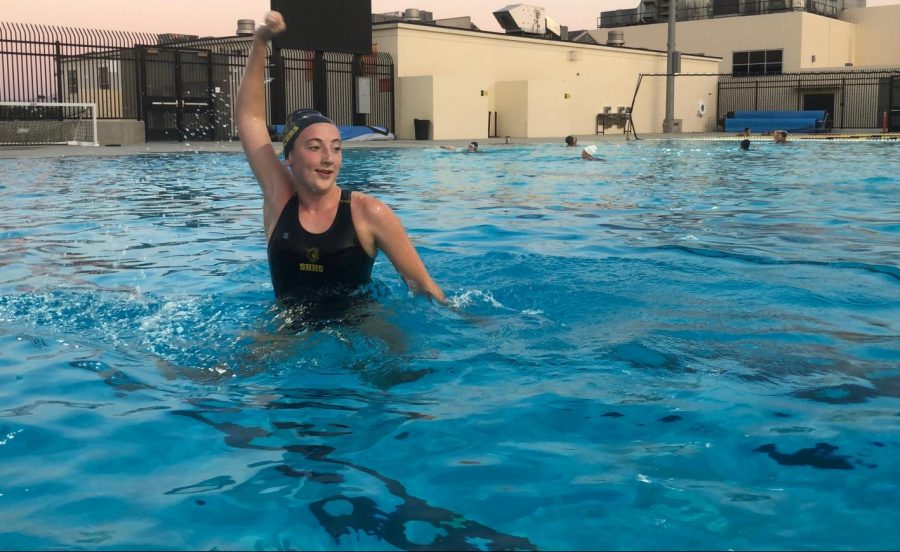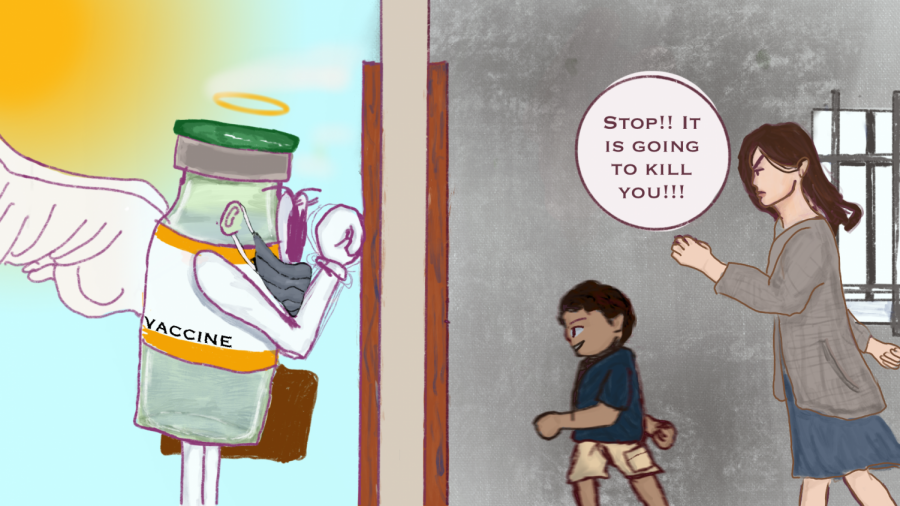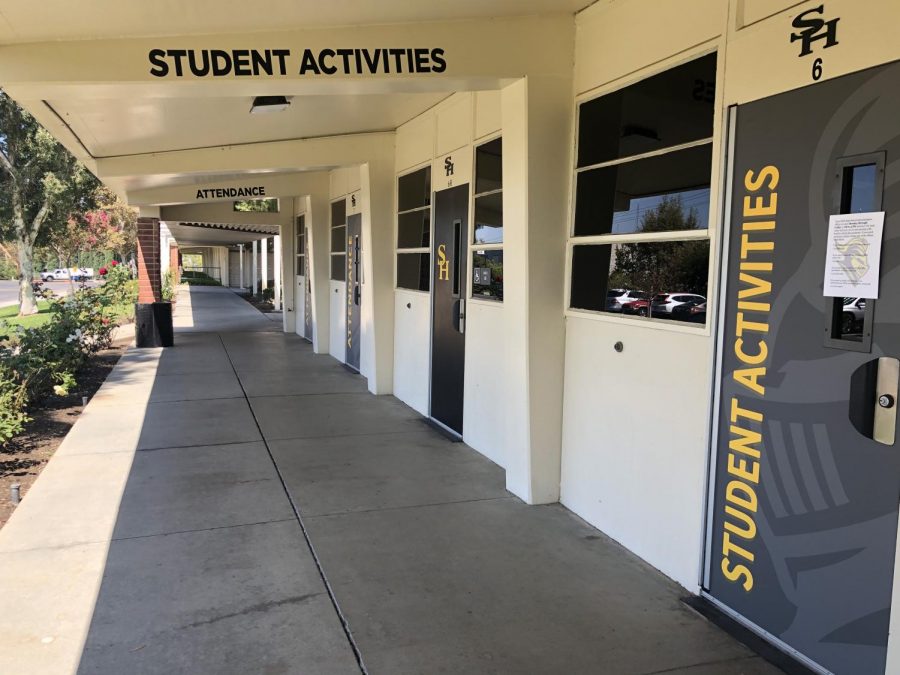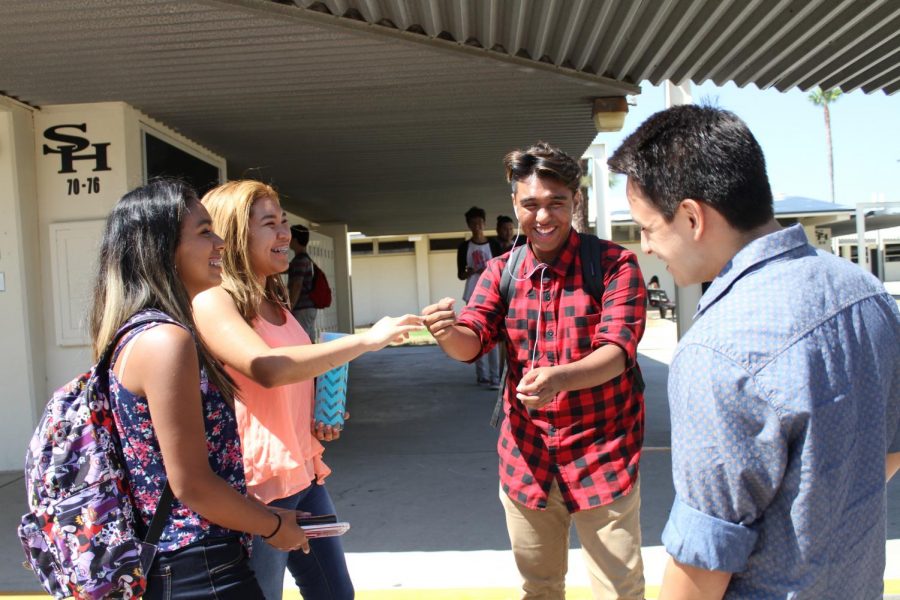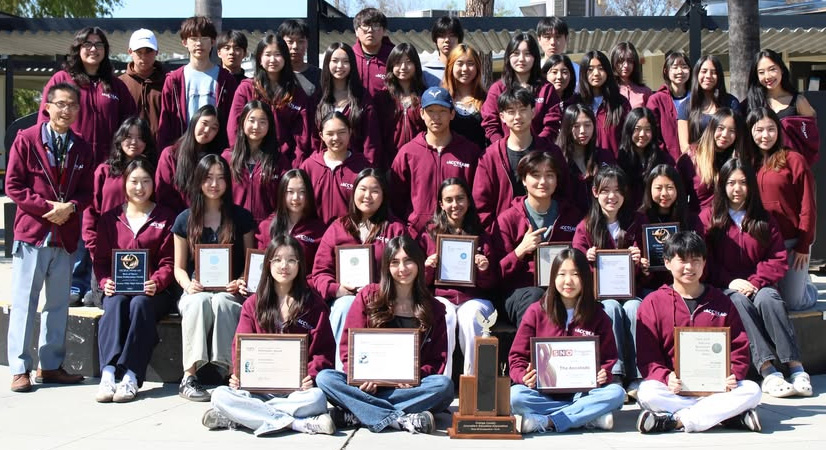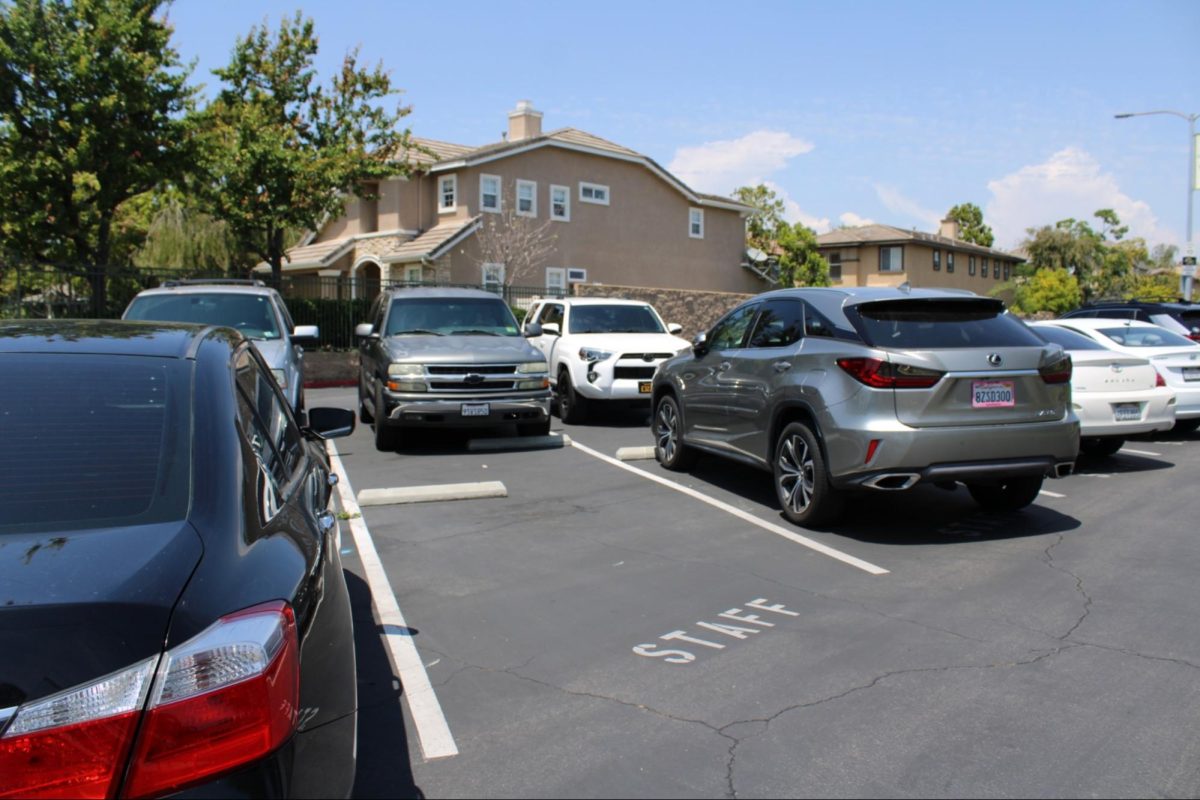Accolade editorial board vote count: Six want the pass/no pass system, five want a standard lettering grade.
With the coronavirus pandemic, school districts across the country have entered unprecedented times: school closures, online classes and Zoom or Google meetings have become the new norm as teachers and students alike face unparalleled circumstances in adjusting to a completely digital school system.
Despite the educational challenges we’re facing, the Fullerton Joint Union High School District [FJUHSD] has decided to carry on with online schooling instead of enhanced learning as some districts in California have done.
But the matter of how grading should be handled still remains undecided.
Currently, the options for the trustees of each district in California based on guidelines provided by the state’s Department of Education remain as such: implement a pass/no pass or credit/no credit system for each class, carry on with the standard letter grade system or base semester grades on third quarter grades, which teachers submitted the week before all FJUHSD schools were shut down.
Our district’s school board is scheduled to hold an emergency meeting at 4 p.m. Thursday, April 23, to vote on one of those options.
The Accolade’s editorial board — made up of the top editors on staff with consultation from our adviser — understands that this is not going to be an easy decision; even we were split about what to decide.
After much consideration, the majority believes the best course of action for the FJUHSD to take is to follow the precedents that have already been established by many colleges and school districts and implement a pass/no pass system for maximum flexibility and compromise in an unparalleled time of uncertainty.
That’s also what the Accolade Opinion survey found as 42 percent of 53 voted in favor of a pass/no pass notation on spring semester transcripts with only 23 percent — nearly half the 42 percent — wanting to stick with letter grades.
Sadly, that runs contrary to the joint recommendation of district officials and the Fullerton Secondary Teachers Organization, which has shown a preference similar to Orange Unified School District’s altered grading system of A-C with “D” grades becoming “C” grades and an “F” becoming no credit.
That runs contrary to the joint recommendation of district officials and the Fullerton Secondary Teachers Organization, which has shown a preference similar to Orange Unified School District’s altered grading system of A-C with “D” grades becoming “C” grades and an “F” becoming no credit.
Though this system aligns with the grading recommendations made by the California Department of Education and attempts to do no harm to its students, the school board should consider surveying parents and students to get another perspective on this issue before solidifying its decision.
Before voting on any recommendations, trustees of the board should ask the district to reach out to the community for the input of those who will ultimately be affected by the decisions made — students and parents.
Northern California school districts such as those in Mountain View and Los Altos (the Palo Alto Unified School District was the first in the state to opt for credit/no credit as early as last month) as well as the Irvine Unified School District (as recently as April 14) have scrapped the standard grading system altogether for a credit/no credit system for each class in an effort to allow for the most equitable options for all students, since not all students have the resources or home situations to succeed in their academics.
In an email to all stakeholders from Terry L. Walker, the Irvine district superintendent mentions his reasoning behind the pass/no pass grading system.
“In recognition of the anxiety, stress and inherent educational inequities that exist across our nation, institutions of higher education are encouraging a credit/no credit model as the most equitable approach to codifying student learning.”
Our trustees should also watch the video recording of the April 14 Irvine board meeting in which Walker rightly emphasized that an “A” in a science class, for example, wouldn’t be a true “A” because students weren’t able to conduct any labs for the last two to three months of the school year. The focus should be instead on learning, instead of the desire to just earn a letter grade.
Factors that ultimately affect grades are highly susceptible to the last-minute disruptions caused by the coronavirus, such as unexpected problems with technology, as well as the personal family matters students may face at home. Many students may be in a position in which their grades are not the highest priority because of urgent external circumstances.
Additionally, school from home has also opened students to the new possibilities of academic dishonesty without being held accountable for their actions and may consequently skew grades to become inaccurate measurements of a student’s abilities.
Confusion, miscommunication and disruptions are to be expected – after all, the foreign unfamiliarity of the coronavirus has left the school system and its pupils exposed to new challenges and impediments.
Lessons over Zoom may be effective during lectures, but when it comes to group discussions and interactive learning, technical difficulties such as malfunctioning Wi-Fi and broken chromebook mics have prevented students from attaining the same quality of education as they would have from attending school in person. These excuses also allow for students to opt out of class participation by claiming that they have broken mics or cameras, without having to face any major consequences.
Furthermore, new attendance policies have allowed students to check in during their allotted periods without accounting for the actual work done for that class period.
During this time of adjusting to our new circumstances, a pass/no pass system for each class would ensure that every student gets a fair chance at getting an acceptable result to the spring semester without having to worry about a GPA.
Especially for juniors, whose grades matter the most in terms of college applications, students whose grades unexpectedly drop from external circumstances may want to resort to the pass/no pass system, and it may relax some of the burden these students face during these trying times.
The University of California and Cal State systems have also stated that they will not view the pass/no pass system in a negative light, so students face little penalty in opting for this grading system, especially for those who are worried about college admissions.
In terms of private universities, a handful of Ivy League schools such as Yale and Columbia universities have also switched to a pass/no pass system for all classes in an effort to lighten the burdens the students may face during the pandemic.
Initially, eight members of the editorial board preferred a student option similar to one that was adopted by Cal State Fullerton and the South Pasadena Unified School District, where students have the freedom to choose between letter grades and a pass/no pass system. (The South Pasadena district consists of only one high school.)
This option would have provided the best middle ground and flexibility for students and would have catered to the needs of each individual without compromising another student’s situation. However, after understanding how that could be quite challenging because it involves minors and their parents’ decisions, too, a re-vote of staff members showed a preference for the pass/no pass system, which we deemed as the second best option.
Ultimately, implementing a pass/no pass system is about learning to adapt to the apocalyptic-like circumstances that the country has fallen into — in which health and safety should be the top priority rather than keeping students worried about their grades amid uncontrollable times.
Before finalizing a decision, the FJUSHD trustees are highly encouraged to consider the perspectives of other stakeholders such as parents and students, the main demographic that the decision will impact. By surveying this demographic, a voice will be given to the population whose interests should be the board’s top priority.
By rejecting the opportunity to give parents and students a say in the matter will unfortunately demonstrate the true priority of the district, implyng that the opinion of district officials and teachers override that of the community.
When given the chance to set new standards for future challenges, the FJUHSD has the opportunity to set the appropriate precedents that will serve students for years – and pandemics – to come. Vote for pass-no pass over letter grades.



